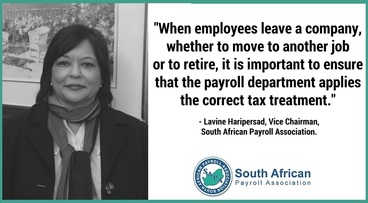 When changing jobs or retiring, it is very important to ensure that the correct tax treatment is applied—or both employer and employee could find themselves at risk. Author: Lavine Haripersad, Vice Chairman, South African Payroll Association When employees leave a company, whether to move to another job or to retire, it is important to ensure that the payroll department applies the correct tax treatment. Typically, the reason for the employee leaving determines the way the final payments are treated by the taxman. Failure to apply the correct principles could make the company vulnerable to penalties from SARS, and the employee could find him- or herself having to make arrangements to pay back some money to SARS on assessment Reasons for leaving If one looks at the most common reasons for people leaving their current employer, it becomes easier to understand the type of tax regime that should be applied. Employees should make it their business to understand the broad principles and raise any queries, in order to avoid having to make unexpected repayments later. Reasons for departure include: • Resignation. When an employee resigns, his or her final payment will typically include a pay-out for any untaken leave, pro rata bonuses and notice pay, if applicable. These payments are subject to normal income tax, and the payroll department does not need to obtain a tax directive. • Operational requirements. This covers both retrenchment and redundancy, both of which result from the operating conditions in which the company finds itself. In the case of redundancy and retrenchment, HR has to apply the rules prescribed in the Labour Relations Act, 66 of 1995, which requires the employer to make a severance payment of (a minimum of) one week’s pay for every completed year of service. For tax purposes, this redundancy lump sum payment must be treated as a retirement lump sum payment. A portion of this lump sum is free of tax (although this will be affected by any previous lump sum benefits obtained). In order to obtain this highly desirable benefit, the employer must first obtain a tax directive from SARS. The tax regime in respect of these severance pay-outs is that the first R500 000 is not subject to tax, the next R200 000 is taxed at 18 percent, the subsequent R350 000 at 27 percent, and all amounts above R1 050 000 at 36 percent. As already noted, these figures have to take into account any previous benefits claimed during prior redundancies. Most importantly, it must be remembered that notice pay, leave pay and pro rata bonuses that are also paid at the time of termination are not part of the severance benefit, and are subject to normal tax. • Mutually agreed separation. When the relationship between employer and employee breaks down, the parties might agree to an amicable parting of the ways to avoid legal disputes. In such cases, a gratuity or final settlement payment is usually made. It will usually be determined following the guidelines for retrenchment packages in Section 41 of the Basic Conditions of Employment Act. The critical point to note here is that because this payment is not made on the basis of operational requirements, it does not constitute a severance benefit. Thus, a portion of this payment may not be treated as a tax-free pay-out, as in the case of a severance for operational requirements. This means that the mutual separation gratuity will be treated as part of the employee’s normal remuneration, and will thus be taxed as such. What can you do? In conclusion, let us stress two points. The first is the one already made, namely that the reason for the termination of the employment relationship will determine how the final payment will be taxed. While the onus is on the employer to ensure that the correct tax regime is followed, if the employee has insufficient tax deducted, he or she will still be liable for the unpaid tax to be paid to SARS—even if the discrepancy only comes to light after some time has elapsed. If employees are unsure, they should first discuss the matter with the payroll department and, if necessary, consult an independent tax practitioner. The second point to emphasise is that to prevent mistakes happening, the traditional communications gap between HR and Payroll needs to be closed. Both parties should make active efforts to improve this situation because if HR makes the reasons for the termination absolutely clear, it is easier for Payroll to apply the correct tax regime. In the end, everybody will benefit, including the employees. ENDS MEDIA CONTACT: Idéle Prinsloo, 082 573 9219, [email protected], www.atthatpoint.co.za For more information on SAPA please visit: Website: http://www.sapayroll.co.za/ Twitter: @SAPayroll LinkedIn: The South African Payroll Association
0 Comments
 Why you should avoid misusing sick leave When it comes to the issue of leave, one of the biggest challenges facing both employer and employee is the misuse of sick leave. A recent study by Occupational Care South Africa and Statistics South Africa found that an average of 15% of employees are absent on any given day, and that only one in three of those absent are actually sick. This is costing the South African economy an estimated R16-billion a year. “The pressure on the organisation isn’t letting up and employees need to remember that they have a job because their employer needs them to fulfil a function,” says Cathie Webb, Director, South African Payroll Association. “If you aren’t there, someone else has to stand in for you so it is important to take your employer into consideration when using your leave, especially sick leave. Some people see their sick leave allowance as a target, rather than something to be taken when absolutely essential.” Not only does the abuse of sick leave cost the organisation in terms of productivity, but the employee will have to use their annual leave should they suddenly need extended leave to recover from an operation, for example. Once that is used up, they will then be on unpaid leave, which will affect them financially. “Employers are much more likely to be approachable in terms of alternative ideas in an emergency if an employee doesn’t have a history of abusing leave,” says Webb, adding that the wisest course of action is for employees to remain within the rules around sick leave. Also important to note is that companies are not legally required to offer the benefits of additional leave elements, such as study or religious leave. On the contrary, many companies are reducing leave allowances due to the current poor economic climate. Employee Responsibility While some companies do not stipulate leave in their contracts, others have very precise regulations and it is up to the employee to know how their company handles the issue of leave. “It is common practise, and legally required, for companies to detail the number of leave days to which an employee is entitled in their employment contract,” says Webb. “While it is good practice to reflect the leave balance due to an employee on payslips, this is not a legal requirement.” In cases where a company does not provide leave information in their contract, the Basic Conditions of Employment Act applies. This is broken down into three distinct categories namely, annual, sick and family responsibility. Employees are entitled to 15 working days per year for annual leave, 30 working days over a three-year period for sick leave and three days per year for family responsibility leave, if they work a 5-day week. A six day working week accrues accordingly. Webb conclude that as an employee of a company the onus thus falls on you to understand exactly what your rights are when it comes to leave. Know what you are entitled to, how it is structured and the rules which dictate it. ENDS MEDIA CONTACT: Idéle Prinsloo, 082 573 9219, [email protected], www.atthatpoint.co.za For more information on SAPA please visit: Website: http://www.sapayroll.co.za/ Twitter: @SAPayroll LinkedIn: The South African Payroll Association  By: Moira du Plessis, sub-committee member, South African Payroll Association The militant and often dreaded appraisal method of evaluating employee performance is facing its demise. Today, performance is measured using a management style that works with employee, team and manager to create a more holistic representation of deliverables and productivity. This is a trend driven by the influx of a younger generation of employee that prefers an open-minded approach in line with the new performance management style. Research also increasingly shows that the successful assessment of employee performance is about coaching, recognition and ongoing discussion. Nowadays its referred to as performance management, a form of one-on-one, two-way communication between manager and employee which helps to fill the gaps. It is a systematic process by which a company involves its employees, as individuals and members of a group, in improving organisational effectiveness in the accomplishment of agency mission and goals. It therefor no longer consists of a meeting between manager and employee where the aforementioned gives scolding feedback on a person’s performance. A changing landscape The difference between the old school appraisal and the modern performance review is down to management and engagement. The former often disempowering staff, leaving them feeling as if they’ve had little opportunity to respond or grow. The latter offers a chance for the employee to create a clear plan for their career path, communicate specific interests and strong points to the manager and potentially focus on how best to utilise these strengths to grow within the company, thus very beneficial in terms of employee growth and satisfaction. The manager can relay where they think the employee’s skills and abilities are best directed and the employee can decide whether or not they agree. For staff who work in payroll, an additional element of the review is to prepare them for the new financial year’s targets. Any performance management system must embrace the value payroll provides to better enable growth and productivity, encouraging staff to use their intellects more and do a wider scope of work. Considering that a significant part of any performance management process is to allow a person to evaluate their own performance and plan their potential for the next three years, the importance of payroll engagement is clear. Globally, payroll is seen as a strategic role, which provides essential insight into management, finance and employee remuneration. If the payroll employee is empowered, they can bring inordinate value to the business. A ripple effect Further important to not is that performance management is far broader than merely assessing a person’s achievements throughout the year. A manager can impact on the performance of their teams by being productive, proactive and fair, creating a ripple effect in terms of leadership and setting standards. It is also important from a management point of view to treat everyone in a company the same, that way all persons at all levels feel valued and this improves employee morale and loyalty, therefore leading to increased performance. In addition, taking care of employee hiring wellness is not only beneficial in terms of retention, loyalty and productivity, it is becoming a defining factor when it comes to and attracting talent – if employees feel cared for on all levels beyond just work, they also perform better. A positive work atmosphere with constructive performance review parameters and long-term support benefits employee, business and bottom line. ENDS MEDIA CONTACT: Idéle Prinsloo, 082 573 9129, [email protected], www.atthatpoint.co.za For more information on SAPA please visit: Website: http://www.sapayroll.co.za/ Twitter: @SAPayroll LinkedIn: The South African Payroll Association |
Welcome to the South African Payroll Association newsroom.
Archives
July 2020
Categories
All
|

 RSS Feed
RSS Feed